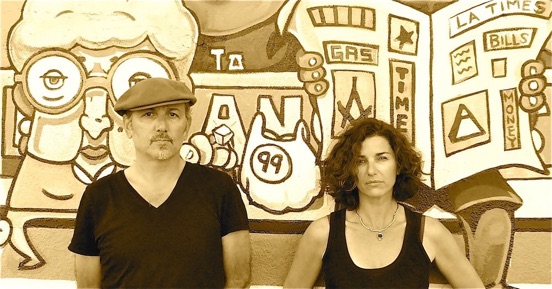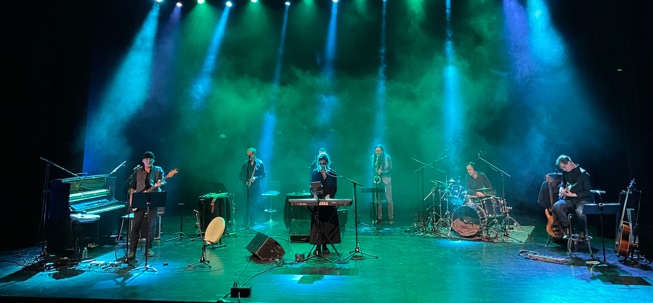Bio
bio en français ci-dessous

Bio
bio en français ci-dessous
Deleyaman is a French-American band founded by American multi-instrumentalist Aret Madilian and French singer Beatrice Valantin in 2000. They have released nine studio albums since and have performed in Europe and North America.
To define a moving entity such as music, one is tempted to search for its anchor or a constant.
Since its creation in 2000, Deleyaman revolves around its founder Aret Madilian, the craftsman of the music and its sound. However, it is no less true that the band also revolves around the vocals of Aret and Beatrice as the voices seem to be as much the central point of the work and the purpose of their music as the compositions themselves.
The third voice of Deleyaman is that of the ancient wind instrument, the duduk, which on each of their albums represents the humanity, the space and the enigma of the music.
The french female voice of the band Beatrice Valantin is influenced as much by the music of our times as she is by classical music and ancient sacred chants.
Aret Madilian, born in Istanbul and raised in a Greek-Armenian family, has migrated from Istanbul to Los Angeles in the late seventies when he was 13 years old. It’s in Los Angeles that Madilian has taken his first creative steps as a musician within the Californian counter-culture forming his post-punk duo (Wog) whose debut album was produced by Spot (Glenn Lockett) from SST Records (Black Flag, Hüsker Du, Minutemen) in 1983.
Initially moving from Los Angeles to Paris in his mid twenties, the American musician and the band are based in a coastal village in Normandy, France since the formation of Deleyaman.
The music of Deleyaman is difficult to classify into a single genre. Their sound varies from post-rock to Anatolian mysticism, from ethereal ballads to cinematic soundscapes, from dream-pop to poetic art-rock.
Collaborations & Soundtrack
Deleyaman's music which lends itself well to cinema has been featured by iconic French actress and director Fanny Ardant on the soundtrack of her third feature film "Le Divan de Staline" (2017)
Deleyaman have also performed several concert-readings with Fanny Ardant.
The first one of their concert-reading which was based on the essay “Our need for consolation is insatiable” by Stig Dagerman, was staged at La Maison de la Poésie in Paris on January 29, 2021. The show was recorded and streamed online.
"Autumn Sun" by Deleyaman from their 2016 album "The lover, The stars & The citadel", was performed on stage by the Australian-British band Dead Can Dance who included the cover of Deleyaman's song on the setlist of their 30 date European tour in 2019.
...
Brendan Perry of Dead Can Dance has also participated in the recordings of several tracks on two previous Deleyaman albums (The lover, The stars & The citadel and Sentinel)
Escape by Deleyaman featuring Brendan Perry on the greek bouzouki
The Valley by Deleyaman featuring Brendan Perry on cimbalom, bouzouki and drums
***
Other collaborations have seen the day with artists such as Glen Johnson, the English ghost-rock band Piano Magic and the Turkish psychedelic-dub band BaBa ZuLa.
In 2017, Deleyaman’s cover version of "Bir sana Bir de Bana", the Turkish song originally written by the psychedelic-oriental dub band Baba Zula appeared in BaBa ZuLa’s 20th anniversary album XX released in January 2017 on Glitterhouse Records. Later that year, Aret and Beatrice of Deleyaman were invited to join BaBa ZuLa on stage to perform the song in Genk, Belgium.
Deleyaman have also toured with Irish singer/songwriter Jules Maxwell (Dead Can Dance, Lisa Gerrard, Brendan Perry) in 2018.
A concert-reading was also performed with Dutch actress Maruschka Detmers during the French literature festival “Terres de Paroles” on October 4, 2023.

Bio en français
Deleyaman a été fondé par le multi-instrumentiste américain Aret Madilian et la chanteuse française Béatrice Valantin en 2000. Le groupe a sorti neuf albums studio depuis et a effectué plusieurs tournées en Europe et en Amérique du Nord.
Pour définir une entité mouvante telle que la musique, on est tenté de chercher un point d’ancrage, une constante.
On pourrait donc dire que depuis sa création en 2000, Deleyaman tourne autour de son fondateur Aret Madilian, principal artisan de la musique et du son. Pourtant il n’est pas moins vrai que la formation s’articule autour de son duo de chanteurs, Aret et Béatrice, tant les voix sont au cœur de l’émotion, de la raison d’être même de cette musique.
La troisième voix singulière du groupe est celle de l'instrument à vent ancien, le doudouk, qui habite chacun de leurs albums et dans la complexité de laquelle semble se concentrer tout ce qui fait leur identité : racines, humanité, espace, nostalgie et mélancolie.
Deleyaman est un projet cosmopolite par nature. La voix féminine française du groupe, Béatrice Valantin, s’est nourrit aussi bien des musiques de son temps que la musique classique et des chants sacrés qui ont baigné son enfance et son éducation.
Aret Madilian, né et élevé à Istanbul dans une famille d’origine et de culture gréco-arménienne, émigre avec elle à Los Angeles à l'âge de 13 ans à la fin des années 70. C’est dans ces antipodes géographiques autant que culturelles qu’il développera sa personnalité musicale. Madilian fait ses premiers pas de musicien au sein de la contre-culture Californienne en formant son premier groupe (Wog) dont le premier album a été produit par Spot de SST Records (Black Flag, Hüsker Dü, Minutemen) en 1983.
Après avoir quitté Los Angeles pour Paris à l'âge de 24 ans, le musicien pose finalement ses valises en Normandie. Ce coin de France sera bien plus que le lieu du hasard des rencontres ; terres de campagne, de rivages gris, de silence et de temps ralenti. Elle est la toile sur laquelle se peint la musique du groupe depuis sa formation en 2000.
Difficile à classer dans un seul genre, Deleyaman voyage entre post-rock et mysticisme Anatolien, ballades éthérées et paysages cinématographiques, dream-pop et art-rock.
Collaborations & Bande-Son
La musique de Deleyaman se prête au cinéma. Elle a été reprise par l’emblématique actrice et réalisatrice française Fanny Ardant, pour la bande originale de son troisième long métrage "Le Divan de Staline" (2017).
Le groupe a également réalisé deux concerts-lectures avec Fanny Ardant en 2021 et 2022. Basé sur l'essai "Notre besoin de consolation est impossible à rassasier" de Stig Dagerman, la première de ces deux représentations a eu lieu à La Maison de la Poésie à Paris en janvier 2021. Le concert a été enregistré et diffusé en ligne. Le deuxième concert-lecture a été présenté au Trianon Transatlantique, Rouen en Janvier 2022.
Le titre "Autumn Sun" de Deleyaman, issue de leur album sorti en 2016 "The lover, The stars & The citadel", a été repris et interprété sur scène par le groupe Anglo-Australien Dead Can Dance qui a inclus le titre de Deleyaman dans la setlist de la tournée européenne Dead Can Dance en 2019.
Brendan Perry de Dead Can Dance a participé à l'enregistrement de trois titres sur deux précédents albums de Deleyaman.
Escape by Deleyaman featuring Brendan Perry on the greek bouzouki
The Valley by Deleyaman featuring Brendan Perry on cimbalom, bouzouki and drums
***
D'autres collaborations incluent des artistes tels que Glen Johnson, le groupe anglais de ghost-rock Piano Magic et l'auteur-compositeur Jules Maxwell (Lisa Gerrard, Dead Can Dance).
En 2017, la reprise par Deleyaman de "Bir sana Bir de Bana", la chanson turque écrite par le groupe de dub psychédélique-oriental Baba Zula est apparue dans l'album XX, 20e anniversaire de BaBa ZuLa, sorti en janvier 2017 sur Glitterhouse Records.
Le groupe a aussi réalisé un concert-lecture avec l’actrice néerlandaise Maruschka Detmers le 4 Octobre 2023, lors du festival “Terres de Paroles” qui s’est déroulé en Normandie, France.
En 2022, Aret Madilian a été invité à composer la musique d'un festival d’art multiculturel qui s'est déroulé dans 14 abbayes de Normandie, en France.
Ses compositions ont été présentées comme une exposition sonore et diffusée dans toutes les abbayes pendant la semaine du festival.
Un album des dix pièces instrumentales d’une durée de 45 minutes a été publié sous le titre The Abbey Project.
